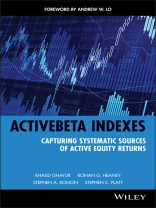An informative guide offering new and innovative ways to think about active management and investing
Active Beta Indexes presents exciting new research that shows how above-market returns can be achieved in a low-cost, transparent, and efficient fashion. Active Betas reflect fundamental investment principles that have long been the foundation of active equity returns, but are commonly masqueraded as investment skill, or alpha. This groundbreaking book lifts the veil to uncover the common sources of active returns and reveals their beta-like properties.
Developed by leading investment practitioners at Westpeak Global Advisors, Active Beta Indexes introduces Active Beta sources and explains how the behavior of short- and long-term earnings growth gives rise to systematic sources of active equity returns.
- Details a new index framework and research findings that could change the face of active portfolio management
- Presents patent-pending innovations for constructing style indexes and informationally-efficient active portfolios
- Explores the historical performance of Active Beta Indexes
Wealth advisers, consultants, pensions and endowments, and other institutional investors will find the intellectual honesty of Active Beta Indexes a refreshing perspective on the active management industry. They will also find it a useful guide to a more strategic allocation of their risk and management fee budgets – a growing necessity in these challenging times.
Inhaltsverzeichnis
Foreword by Andrew W. Lo xi
Preface xiii
SECTION ONE Background
CHAPTER 1 The Evolution of Market Indexes and Index Funds 3
The Early Days of Indexing 3
The Inception of the Mutual Fund Industry 5
Enter Academia 6
The Advent of Index/Passive Mutual Funds 7
Index Mutual Funds for the Public 8
Conclusion 9
CHAPTER 2 The Evolution of Equity Style Indexes 11
Empirical Challenges to Financial Theories 11
Theoretical Explanations of Anomalies 13
Establishing Equity Styles 14
Equity Style Index Methodology 16
Pitfalls of Current Equity Style Indexes 17
Conclusion 17
SECTION TWO Active Beta Conceptual Framework
CHAPTER 3 Introducing Active Betas 21
Defining Active Betas 21
Identifying the Drivers of Equity Returns 24
Verification 26
Exploring the Behavior of Return Drivers 28
CHAPTER 4 Behavior of Short-Term Earnings Expectation and the Link with Price Momentum 29
Analysis Methodology 29
Relationships Studied 31
Decomposing Momentum Returns 48
Conclusion 51
Appendix: Regression Analysis and Correlation Coefficient 51
CHAPTER 5 Behavior of Long-Term Earnings Expectation and the Link with Value 53
Relationships Studied 53
Investment Horizon of Value Strategies 70
Implications for Stock Risk Premium 74
Decomposing Value Returns 76
Conclusion 79
CHAPTER 6 Pricing and Persistence of Systematic Sources of Active Equity Returns 81
Pricing of the Systematic Sources of Active Equity Returns 81
Persistence of the Systematic Sources of Active Equity Returns 89
Momentum, Value, and Risk Aversion 94
Active Beta Framework: A Summary of Relationships 99
SECTION THREE Active Beta Indexes
CHAPTER 7 Active Beta Index Construction Methodology 103
Investment Process Indexes 104
Objectives of Investment Process Indexes 105
Conflicting Objectives 108
Transparency, Understanding, and Rationale of the Active Beta Momentum Index 110
Active Beta Index Construction Process 110
Differences in Construction between Active Beta Indexes and Other Public Style Indexes 112
Achieving Objectives 114
Conclusion 120
Appendix: Active Beta Index Construction Process Example 120
CHAPTER 8 Historical Performance of Active Beta Indexes 123
Active Beta Index Construction Process Overview 123
Active Beta Index Performance: Highlights 126
Active Beta Index Performance: Detailed Analysis 127
Active Beta Index Exposures 149
Conclusion 153
CHAPTER 9 Active Beta Index Applications 155
Style Investing: A New Framework 155
Performance Attribution: Decomposing Active Manager Returns 160
Portfolio Structuring: Revisiting the Alpha-Beta Return Separation 164
Performance Benchmarking 169
Research and Analysis 172
Investment Vehicles 174
SECTION FOUR Active Beta Customizable Solutions
CHAPTER 10 Alternative Solutions for Capturing Active Betas 179
Active Beta Custom Indexes 179
Active Beta Custom Solutions 183
A Word on Traditional Active Management 194
Conclusion 197
CHAPTER 11 Concluding Remarks 199
Disclosures 201
Bibliography 203
About the Authors 207
Index 209
Über den Autor
Khalid Ghayur is the CEO and CIO of Westpeak Global Advisors, LP. He was director of research policy, a member of the Global Executive Committee, and chairman of the Index Policy Committee at Morgan Stanley Capital International (MSCI) Barra. Prior to this, he was global head of quantitative research and strategy for HSBC Global Asset Management. He is a CFA charterholder, has served on the Board of Governors of the CFA Institute, and is a former trustee of the CFA Institute Research Foundation. He received an MBA in finance and international business from the Ecole Nationale des Ponts et Chaussees and an MA and BA in economics from the University of Karachi.
Ronan G. Heaney is Director of Research at Westpeak. Before joining Westpeak, he was a software architect with Multum Information Services and a senior software developer at Swiss Bank Corp. He holds an MS in computer science from Purdue University and a BS in applied physics from Dublin City University, Ireland.
Stephen A. Komon is a Senior Portfolio Manager at Westpeak. Prior to this, he was vice president of foreign exchange and commodities at J.P. Morgan & Co., and he also held positions with UBS AG/Swiss Bank and Dean Witter Reynolds. He holds an MBA in finance and accounting from the University of Chicago Booth School of Business and a BS in commerce from the University of Virginia. He is also a CFA charterholder.
Stephen C. Platt is Director of Portfolio Management at Westpeak. Before joining Westpeak, he cofounded and was a senior vice president of Cordillera Asset Management. He holds a BS in finance from the University of Colorado Leeds School of Business and is a CFA charterholder.












